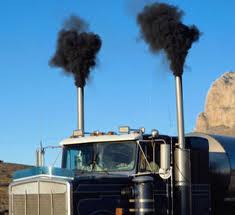World Health Organization (WHO) has raised the status of diesel exhaust from ‘probable carcinogen’ to carcinogen as it belongs and of the same category of a mustard gas and asbestos which are ‘major cancer risk’.
Exhaust fumes from diesel engines do cause cancer, a panel of experts from the France-based International Agency for Research on Cancer (IARC), working for the World Health Organization says.
It has carcinogen substances that have linked to cancer, that regular exposure to the same, is likely to cause cancer as passive smoking.
‘Exhaust fumes is on the same order of magnitude as passive smoking,’said Kurt Straif, director of the IARC department that evaluates cancer risk
The experts, who said their decision was unanimous and based on ‘compelling’ scientific evidence, urged people across the world to reduce exposure to diesel fumes as much as possible.
‘The IARC working group found that diesel exhaust is a cause of lung cancer and also noted a positive association with an increased risk of bladder cancer,’ it said in a statement.
IARC’s director Christopher Wild said that against this background, their conclusion ‘sends a strong signal that public health action is warranted’.
‘This emphasis is needed globally, including among the more vulnerable populations in developing countries where new technology and protective measures may otherwise take many years to be adopted,’ he said in a statement.
The decision is a result of a week-long meeting of independent experts who assessed the latest scientific evidence on the cancer-causing potential of diesel and gasoline exhausts.
It puts diesel fumes in the same risk category as noxious substances such as asbestos, arsenic, mustard gas, alcohol and tobacco.
IARC noted that large populations all over the world are exposed to diesel exhaust in everyday life, whether through their jobs or in ambient air.
‘People are exposed not only to motor vehicle exhausts but also to exhausts from other diesel engines such as diesel trains, ships and from power generators,’ it said.
Dr. Lesley Walker, director of cancer information at Cancer Research UK, said, ‘The evidence of harmful health effects of diesel, particularly for people exposed to high levels through their jobs, has been accumulating for many years.
‘But, the overall number of lung cancers caused by diesel fumes is likely to be a fraction of those caused by smoking tobacco.’
Christopher Portier, chairman of the IARC working group, said, ‘Given the additional health impacts from diesel particulates, exposure to this mixture of chemicals should be reduced worldwide.’
The announcement by WHO has caused consternation among car and truck manufacturers, who claim that diesel fuel engines are constantly being refined.
The global auto industry had argued diesel fumes should be given a less high-risk rating to reflect tighter emissions standards.
Allen Schaeffer, executive director of the Washington-based Diesel Technology Forum said, ‘New technology diesel engines, which use ultra-low sulfur diesel fuel, advanced engines and emissions control systems, are near zero emissions for nitrogen oxides, hydrocarbons and particulate matter,’
IARC said it had considered recent advances in technology which had cut levels of particulates and chemicals in exhaust fumes, particularly in developed economies, but said it was not yet clear how these might translate into health effects.
‘Research into this question is needed,’ it said.
Alan Baum, principal of Baum and Associates in Michigan, said it is unlikely that the IARC report will cause companies to change plans for expansion of diesel fuel in the United States.
Approximately six percent of new autos, including light-duty pickup trucks, sold in the United States run on diesel, said Baum, and he said that figure is expected to rise to about ten percent by 2015.
